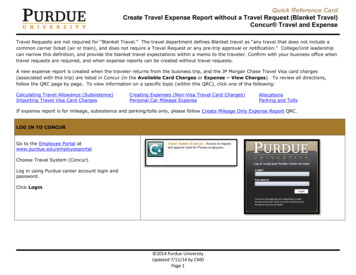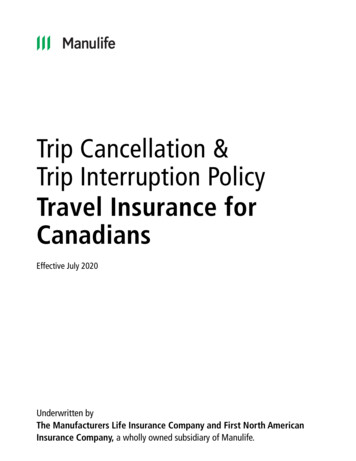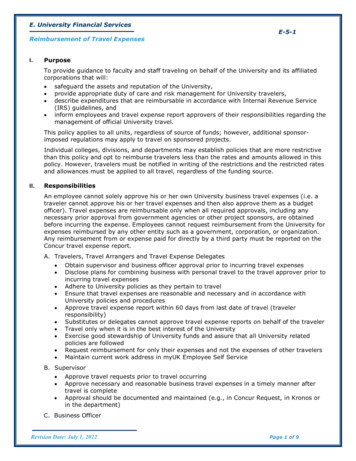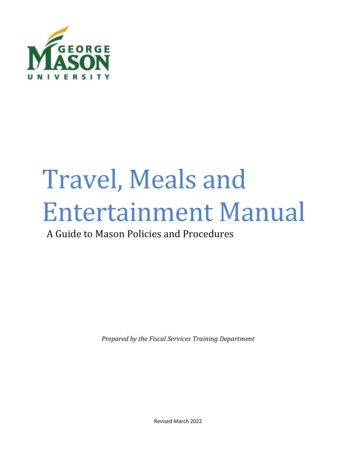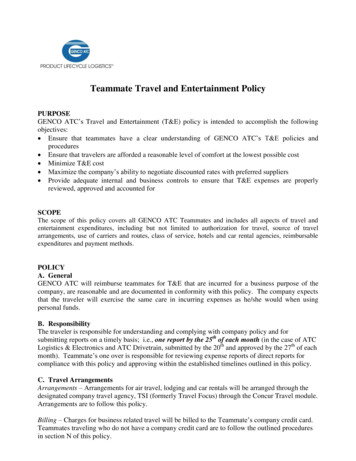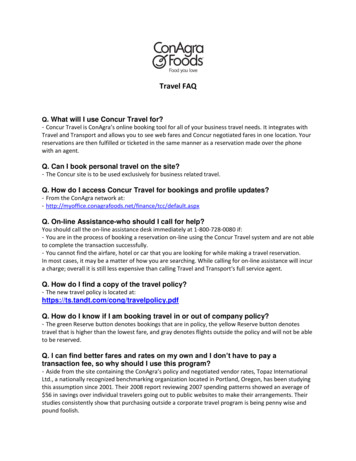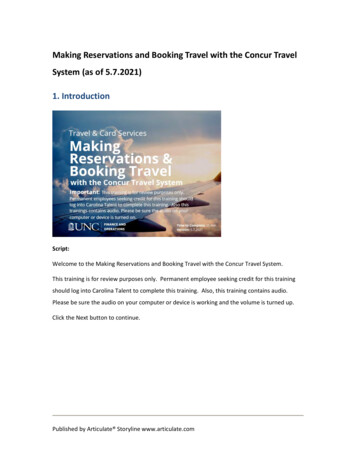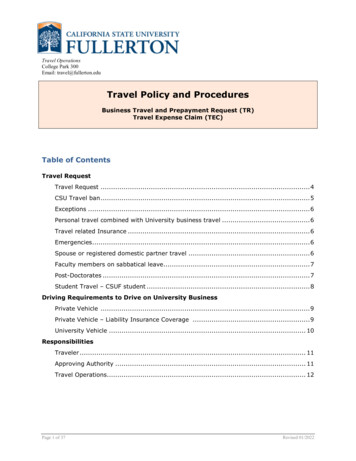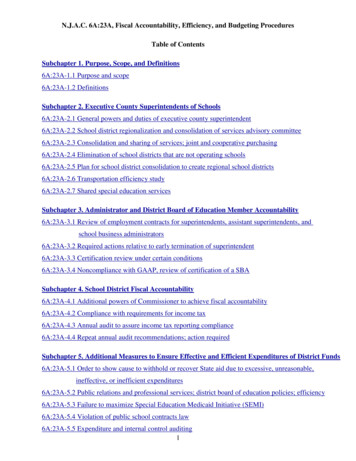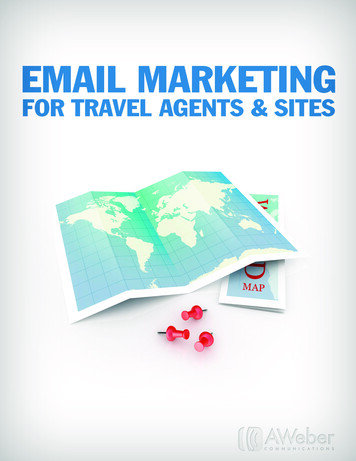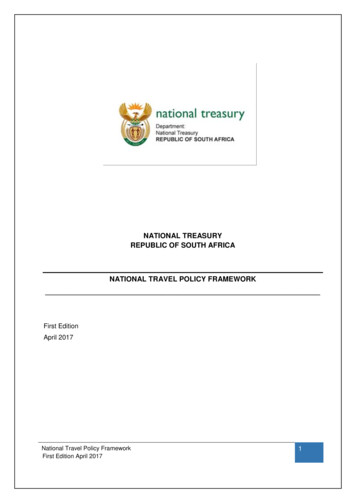
Transcription
NATIONAL TREASURYREPUBLIC OF SOUTH AFRICANATIONAL TRAVEL POLICY FRAMEWORKFirst EditionApril 2017National Travel Policy FrameworkFirst Edition April 20171
1INDEX1.PREAMBLE . 32.POSITION STATEMENT . 33.PURPOSE OF THE NATIONAL TRAVEL POLICY FRAMEWORK . 34.SCOPE OF APPLICATION . 35.SOURCES OF AUTHORITY . 46.ACRONYMS . 57.DEFINITIONS . 58.GENERAL PRINCIPLES . 79.ROLES AND RESPONSIBILITIES . 1110.TRAVEL MANAGEMENT COMPANY . 1211.GROUND TRANSPORTATION . 1212.AIR TRAVEL . 2013.ACCOMMODATION . 2414.TRAVELLER HEALTH AND SAFETY . 2815.TRAVEL INSURANCE . 2916.ADMINISTRATION OF TRAVEL EXPENSES . 3017.GENERAL MATTERS . 4118.KNOWLEDGE SHARING. 4219.TRAVEL POLICY REVIEW AND GOVERNANCE . 4220.EFFECTIVE DATE OF POLICY . 43National Travel Policy FrameworkFirst Edition April 20172
1.PREAMBLE1.1Section 38(1)(a)(iii) and 51(1)(a)(iii) of the PFMA requires AOs and AAs to ensure thattheir department, trading entity, constitutional institution or public entity has and maintainsan appropriate procurement and provisioning system which is fair, equitable, transparent,competitive and cost-effective.1.2Section 38(1)(b) of the PFMA requires AOs of departments and constitutional institutionsto be responsible for the effective, efficient, economical and transparent use of theirrespective Institution’s resources.1.3AOs of departments and constitutional institutions are reminded that sections 38(1)(c)(ii)of the PFMA requires AOs to take effective and appropriate steps to prevent unauthorisedexpenditure (in the case of departments), irregular expenditure and fruitless and wastefulexpenditure.1.4AAs are reminded that section 51(1)(b)(ii) of the PFMA requires AAs to take effective andappropriate steps to prevent irregular expenditure and fruitless and wasteful expenditure.1.5Section 45(c) and section 57(c) of the PFMA, requires employees to take effective andappropriate steps to prevent unauthorised expenditure (in the case of employees ofdepartments), irregular expenditure and fruitless and wasteful expenditure (in the case ofemployees of all Institutions) within their respective areas of responsibility.1.6Institutions are to adopt and adapt the NTPF as a minimum standard to develop similar ormore stringent Institutional policies, instructions and standard operating procedures in linewith their unique requirements and delegations of authority.2.POSITION STATEMENTThe State has an effective, efficient, practical and fit for purpose travel managementsystem that delivers cost effective travel arrangements in support of its mandate.3.PURPOSE OF THE NATIONAL TRAVEL POLICY FRAMEWORK3.1The purpose of the NTPF is to create minimum norms and standards for Travellerstravelling on official business both domestically and internationally.3.2Travellers must make every effort to ensure that their travel arrangements are inaccordance with the minimum standards outlined herein and utilise these minimumstandards to ensure efficient, cost effective, transparent and responsible travel relatedarrangements.3.3The NTPF provides a policy framework for consistent decision making by Institutions thatfacilitates travel, accommodation and related expenditure by Travellers.4.SCOPE OF APPLICATION4.1The NTPF applies to all Travellers, travelling on official business, which is inclusive of thestaff of Ministries, but excludes Members and National Members, as defined in theMinisterial Handbook.National Travel Policy FrameworkFirst Edition April 20173
4.2The NTPF applies to both International Travel and Domestic Travel arrangements. Wheredistinction is required, the NTPF clearly indicates this.4.3The NTPF contains principles relevant to certain circumstances; it does not includeprocedures or processes. Institutions are required to draft their own institutional policies,instructions and procedures using the NTPF as a minimum standard and may adapt thepolicy principles, contained herein, as may be required having regard to the mandate andoperations of the Institutions.5.SOURCES OF AUTHORITYThe following laws, regulations and guidelines apply to this NTPF:a)Basic Conditions of Employment Act, No. 75 of 1997b)Compensation for Occupational Injuries and Diseases Act, No. 130 of 1993;c)Constitution of the Republic of South Africa, 1996;d)Cost Containment Instructions issued by National Treasury;e)Defence Act, No. 42 of 2002;f)Financial Manual as published by the Department of Public Service andAdministration;g)Guide for Employers in respect of Allowances issued by the South African RevenueServices;h)Income Tax Act, No. 58 of 1962;i)Labour Relations Act, No. 66 of 1995;j)Military Pensions Act, No. 84 of 1976;k)Military Veterans Act, No. 18 of 2011;l)Ministerial Handbook;m)Occupational Health and Safety Act, No. 85 of 1993;n)Preferential Procurement Policy Framework Act, No. 5 of 2000;o)PSCBC Resolution 3 of 1999 - Remunerative Allowances and Benefits;p)Public Finance Management Act, Act No. 1 of 1999;q)Public Service Act, No. 103 of 1994;r)Road Accident Fund Act, No. 56 of 1996;s)Road Traffic Act, No. 93 of 1996;t)South African Civil Aviation Act, No. 13 of 2009;u)South African Police Service Act, No. 68 of 1995;v)Tariffs for the use of Motor Transport as determined by the Department of Transport;andw)Any instruments, directives or standards issued in terms of any of the abovelegislation, as it relates to travel.National Travel Policy FrameworkFirst Edition April 20174
FMAS&TSARSSMSTMC7.Accounting AuthorityAnti-Lock Braking SystemAccounting OfficerChief Executive OfficerChief Financial OfficerChief Operating OfficerDepartment of International Relations and CooperationDelegation of AuthorityDepartment of Public Service and AdministrationMiddle Management ServiceNational Travel Policy FrameworkOffice of the Chief Procurement OfficerPublic Finance Management Act, No.1 of 1999.Subsistence and TravelSouth African Revenue Services.Senior Management ServiceTravel Management CompanyDEFINITIONSAccommodation: means the rental of lodging facilities while away from one’s place ofabode, but on authorised official duty.After-Hours Reservation: means an enquiry or travel request that is actioned afternormal working hours, i.e. 17h00 to 8h00 on Mondays to Fridays and twenty-four (24)hours on weekends and public holidays.Air Travel: means travel by airline on authorised official business.Authorising Official: means the Official who has delegated authority in term of theInstitution’s DOA Policy, to approve travel requests and expenses.Car Rental: means the rental of a vehicle for a defined period of time by a Traveller forofficial business purposes.Delegated Official: means an official or employee authorised in writing by the AO/AA interms of section 44 and 56, respectively, of the Public Finance Management Act, 1999(Act No. 1 of 1999) or any other enabling legislation to exercise a power or perform a dutyset out in the relevant legislation, subject to such conditions as may be determined by therelevant AO/AA.National Travel Policy FrameworkFirst Edition April 20175
Domestic Travel: means travel within the borders of the Republic of South Africa or withinthe borders of the foreign country where the Official is based.Emergency: means an event where unforeseen and unavoidable circumstances,including but not limited to, a death, illness, health risk or a business environmental risk,requires a booking for travel or a diversion from the original planned trip.Governance Committee1: means external members belonging to a body that providesoversight and assurance functions over the operations of an Institution. Such GovernanceCommittees include:a)b)c)d)The Board and its sub-committeesDepartmental Audit CommitteesDepartmental Risk Committees and/orDepartmental Anti-corruption Committees.International Travel: means travel outside the borders of the Republic of South Africa oroutside the borders of the foreign country where the Official is based.Institution: means all departments, constitutional institutions; public entities listed inschedule 2 and 3 to the PFMA, trading entities, organs of state and governmentcomponents unless specified otherwise in this policy.Official Business: means performing the Institution’s functions in terms of their mandateand strategic, operational and performance plans.Official: means any person employed by, or seconded to, a department, constitutionalinstitution; public entity listed in schedule 2 and 3 to the PFMA, trading entities, organs ofstate and government components, unless specified otherwise in this policy.Place of Duty: means the place, other than the Place of Work, where the Official performsofficial business or is otherwise on duty, e.g. an external meeting venue, conference venueor workshop.Place of Work: means the place of work identified in the Official’s contract of employment.Shuttle Service: means the service offered to transport a Traveller from one point toanother and includes taxi services.Subsistence Allowance: means the money paid to a Traveller travelling on OfficialBusiness to cover cost of travel, meals, and other associated expenses2.Traveller3: means a person travelling at the behest of the Institution on Official Business.1Institutions may include other governance committees applicable to the Institution which include external members.2Reasonable expenses in respect of dry cleaning, laundering, meals not included in the accommodation and reasonable incidentalexpenses.3Institutions may include, but not limited to, other categories of employees, executives, other policy beneficiaries in line with applicableemployment conditions, e.g. Institution bereavement, wellness and recruitment policies; Research collaboration support such asresearchers, postgraduate students, utilising shared research platforms, Non-executive members, appointed members of aCommittee, appointed members of a Commission of Enquiry, persons appointed as advisors on grounds of policy considerations inNational Travel Policy FrameworkFirst Edition April 20176
Travel Advance: means the funds advanced to an Official or Traveller prior to embarkingon an official trip.Travel Authorisation Form: means the official form utilised by the Institution reflectingthe detail and order number or unique authority number of the trip that the relevantAuthorising Official approves.Travel Booker: means the person coordinating travel reservations with the TMCconsultant on behalf of the Traveller.Travel Expenses: means expenses incurred by a Traveller while he/she is on an OfficialBusiness trip. Examples of Travel Expenses may include money spent on lodging,transportation and meals.Travel Management Company: means the company contracted to provide travelmanagement services, which is inclusive of the procurement of travel related services.Travel Voucher: means a document issued by the TMC to confirm the reservation and,or, payment of specific travel arrangements.8.GENERAL PRINCIPLES8.1Institutions allow the Travel Booker or appointed TMC to make travel arrangements onbehalf of the Institution that is in line with the provisions of the Institution’s Travel Policy.8.2Institutions make bookings utilising their institutional negotiated rates and fares, thegovernment negotiated corporate rates and fares where applicable, e.g. discounted airfares with airlines, or, where the TMC can obtain better rates or fares, the TMC rates orfares for travel services within the maximum allowable rates as prescribed by the NationalTreasury.8.3Institutions must ensure that the Travel Booker or the appointed TMC compare variousairline fares, Accommodation establishment rates and Car Rental rates before confirminga booking, maintaining the principles of competitiveness and cost effectiveness 4 insupporting the Institution’s sustainability.8.4Each Traveller must exercise good and ethical judgement when incurring TravelExpenses.8.5Each Traveller must obtain prior approval from the Authorising Official for any travelarrangements.8.6The Authorising Official must consider, prior to approving travel requests:a)The necessity to travel; limited to the absolute critical trips in support of theInstitution’s mandate;terms of section 12A of the Public Service Act of 1994, interview candidates and other government employees where an employeremployee relationship exists as defined in the Labour Relations Act or similar, e.g. International Labour law (in the case of employeesbased in foreign countries) and other applicable legislation, invited guests, care attendants to a Traveller with a disability.4Preferential Procurement Regulations, 2017, 6(9)(a) & (b)National Travel Policy FrameworkFirst Edition April 20177
b)c)d)The benefit to the Institution;Use of alternative face to face technologies i.e. Skype, video conference; andCompliance with the Institution’s Travel Policy8.7Each Traveller conducts business in a manner that excludes considerations of personaladvantage while complying with all applicable policies.8.8Compliance with the Institution’s travel policy is the responsibility of all Officials, Travellers,Travel Bookers, appointed TMCs and any other person involved with travel relatedmatters.8.9Each Traveller must safeguard the State’s information and assets while travelling onOfficial Business and must avoid compromising on that security.8.10Each Traveller must maintain, for Official Business purposes, the validity of necessarypersonal travel documents such as a passport, visa, international driver’s licence, etc. TheTraveller may claim any justifiable costs of doing so from the Institution where the relevantAuthorising Official provides prior approval.8.11Institutions must limit International Travel to critical trips and limit the number of thedelegation to Travellers directly involved in the subject matter of the meeting or event.8.12All requests for International Travel must include the following:a)b)c)A motivation for the visit, especially its benefit for the Government and the country;The financial implications of the visit; andThe support delegation, including the roles of each Official.8.13Motivation for International Travel, as set out in paragraph 8.12 above, does not apply incases where South Africa has signed an international treaty with the particular countrybeing visited (e.g. the Convention for Nuclear Safety) and, or, where an Institution ischarged with a mandate to execute such an international treaty on behalf of the State.8.14Before a Traveller departs to an international destination, he or she is responsible forobtaining, with the assistance of the TMC, information relating to the following:a)b)c)d)e)8.15What is the most appropriate method of payment for Accommodation and services,e.g. cash, virtual cards, cash cards, daily allowance advance or foreign debit cards;What is the most practical currency;Consult a travel clinic well in advance where inoculation is required;Take cognisance of the political and security situation in the country; andConfirm the applicable business etiquette.In order to ensure business continuity and protect the interests of the Institution, thefollowing Travellers are not allowed to travel together in the same aircraft, vehicle or boat:a)In the case of departments and constitutional institutions:i.The Minister and the Deputy Minister;ii.The Deputy Minister and the Director General;iii.The Director General and more than half of the number of the Deputy DirectorGenerals; and, or,National Travel Policy FrameworkFirst Edition April 20178
iv.b)8.16Not more than a third of the senior management team of the institution.In the case of public entities:i.The Chairperson and the Vice/Deputy Chairperson;ii.The Chairperson and the CEO;iii.The Chairperson and more than half of the members of the Board;iv.The CEO/COO and CFO;v.The CEO/COO and half of the CEO’s executive committee;vi.Not more than a third of the senior management team of the Institution; and,or,vii.Not more than half of the members of the Board and half of the CEO’sexecutive committee.Cost Containment8.16.1AOs and AAs must implement policies and procedures to restrict the number of Officialsand, where applicable, persons appointed on policy considerations5 travelling to thesame event, conference, consultation or meeting to reasonable and necessaryrepresentation, including representations to Parliament or Provincial Legislatures.8.16.2Delegations to the same event, conference, consultation or meeting may only exceedthree (3) Officials or, where applicable, persons appointed on grounds of policy, ifapproved in advance by the relevant AO/AA or Delegated Official.8.16.3The provisions of paragraphs 8.16.1 and 8.16.2 above do not apply to –(a)(b)(c)(d)(e)(f)(g)(h)(i)8.16.456AOs of departments and constitutional institutions;Deputy directors-general or persons holding equivalent ranks in departments6Persons appointed on grounds of policy considerations in terms of section 12Aof the Public Service Act, 1994;Employees at the level of management who report directly to the CEO of aconstitutional institution;Members of the AA of a public entity;The CEO or any other person in charge of the public entity;Members of the CEO’s executive committee that report directly to the CEO or toany other person in charge of the public entity;Officials of departments, constitutional institutions and public entities performingofficial duties in Parliament or in a provincial legislature other than those referredto in paragraph 8.16.1 above; andNon-executive members serving on any Governance Committee in a department,constitutional institution or public entity.The double payment of expenses or Travel Advances or expense claims withoutsupporting receipts, where applicable, expenses included in any travel allowance given,or claiming a reimbursement for the cost of meals where the cost of meals is alreadyPolicy Advisors appointed in terms of section 12A of the Public Service Act, 1994.This does not apply to persons holding other ranks/positions in departments but who are remunerated at salary levels 15.National Travel Policy FrameworkFirst Edition April 20179
included in the Accommodation cost, is fruitless and wasteful expenditure and will bedealt with accordingly.8.16.58.17The Institution must reduce an allowance where the Institution or another party or hostare paying for the claimed expenses. The Institution recovers the over payment fromthe Traveller in accordance with applicable legislation and prescripts.Authorisation8.17.1Principles of Authorisation8.17.1.1Travellers are not allowed to approve their own travel requests and travel expenditure.8.17.1.2Where the Traveller is the Director General / Head of Department / CEO or Chairpersonof the Board of the Institution, and on condition that segregation of duties is upheld, theCFO must confirm the expenditure prior to departure in terms of a specific delegationof authority from the higher authority that would have approved and/or would have beenratified by the Board or in terms of an Institution’s Delegation of Authority Policyupholding these principles.8.17.1.3All travel approvals must be in writing and signed by the Authorising Official prior todeparture. In cases where obtaining verbal authorization from the Authorising Official,it is the responsibility of the Traveller to have the authorisation ratified by the AuthorisingOfficial within 72 hours from obtaining the verbal authorisation.8.17.1.4The AO/AA or Delegated Official may, in terms of the applicable legislation allowing anInstitution to delegate, and the Institution’s DOA Policy, delegate the approval of thefollowing:i.ii.iii.iv.v.vi.vii.Domestic Trips with its related expenses related to: Air Travel Ground Transportation AccommodationInternational Trips with its related expenses related to: Air Travel Ground Transportation AccommodationInternational and domestic chartering of an aircraft (passenger / cargo)Upgrade of class of Domestic Travel Air Travel Ground Transportation AccommodationUpgrade of class of International Travel Air Travel Ground Transportation AccommodationInternational and domestic non-employee TravelChanges to existing domestic reservations Air TravelNational Travel Policy FrameworkFirst Edition April 201710
viii.ix.x.xi.9. Ground Transportation AccommodationChanges to existing international reservations Air Travel Ground Transportation AccommodationDomestic After-Hours Reservation/Emergency Travel arrangements Air Travel Ground Transportation AccommodationInternational After-Hours Reservation/Emergency Travel arrangements Air Travel Ground Transportation AccommodationInternational and domestic reimbursement of travel expenses and allowances Air Travel Ground Transportation AccommodationROLES AND RESPONSIBILITIESResponsibilityBusiness Activity9.1Governance of the Travel Policy9.1.1NTPF formulation and the amendmentstheretoNational TreasuryOCPO9.1.2Institution’s Travel Policy formulation(based on NTFP) and amendmentstheretoAO/AA or as per the Institution’sDOA Policy9.2Corporate and Institutional Agreements9.2.1Travel Management Companies9.2.1.1National Treasury Instruction 4 of2016/17 on the Minimum BidSpecification Requirements for theappointment of TMCsNational TreasuryOCPO9.2.1.2Appointment of TMC in terms ofprescribed procurement processes,applying the Minimum Bid SpecificationRequirements.AO/AA or Delegated Official9.2.2Providers of Travel related Services9.2.2.1Corporate Airline Agreements Negotiation and approval of theterms of the agreementNational Travel Policy FrameworkFirst Edition April 2017National TreasuryOCPO11
Business Activity9.2.2.2Instructions on Cost Containmentrelated matters, such as: 9.2.2.3ResponsibilityNational TreasuryOCPOMaximum allowable rates forAccommodation:Air fares:Car Rental; andShuttle Services, etc.Appointment of travel service providers(e.g. Car Rental companies, ShuttleServices, events coordinators,Accommodation establishments) interms of prescribed procurementprocessesAO/AA or Delegated Official10.TRAVEL MANAGEMENT COMPANY10.1The Institution may appoint one or more TMCs. This must be done in accordance with theapplicable prescripts and instructions issued by National Treasury to effectively andefficiently manage the Institution’s travel services.10.2The Institution must manage the TMC to deliver cost-effective and operationally efficientsupport in achieving the Institution’s mandate.10.3In the absence of the contracted services of a TMC, Institutions would have the option toadminister the procurement of travel related services via the prescribed procurementprocesses.10.4The TMC must only issue Travel Vouchers (Accommodation and ground transportation)and air tickets after the receipt of the Travel Authorisation Form or purchase order.10.5In the event of an After-Hours Reservation, the TMC must execute the request based ona verbal approval or approval via Short Message Service (SMS) or email from theAuthorising Official. The Institution must present the Travel Authorisation Form orpurchase order to the TMC within 72 hours after the request was executed by the TMC toavoid irregular or fruitless and wasteful expenditure. The TMC may follow up with theInstitution and upon failure by the Institution to submit the Travel Authorisation Form orpurchase order, the TMC may proceed to invoice the transaction.11.GROUND TRANSPORTATION11.111.1.1General PrinciplesThe Institutions must utilize the most cost-effective mode (e.g. Car Rental, publictransport, Shuttle Service, etc) of transportation at all times.National Travel Policy FrameworkFirst Edition April 201712
11.1.2Travellers are encouraged to make use of public transport (i.e. Uber, Gautrain, taxi,etc.) or Shuttle Services when travelling to and from the airport if it is safe and morecost effective than the cost of Car Rental and, or, the cost of parking and, or, kilometresclaimed.11.1.3When the Traveller is travelling by air on a one-day visit to another Institution, he or shemust, where possible, make arrangements with the relevant Institution to be picked upfrom and dropped off at the airport.11.1.4In cases where the trip includes both air and road travel, Travel Bookers must selectthe mode and combination thereof that is the most cost-effective, taking into accountthe cost of the trip, time consumed and productivity.11.1.5Where a number of Travellers/Officials are attending the same official function ormeeting, they must at all times attempt to reduce the cost to the Institution by using onevehicle where circumstances permit. This provision also applies to SMS Officials.11.1.6Only Officials (permanent and contracted) have the authority to drive rental vehiclesand institutional fleet vehicles. In exceptional circumstances, Institutions may authorizeother Travellers to drive rental vehicles or institutional vehicles for official purposes,subject to the completion of all relevant indemnities and approval in terms of theInstitution’s DOA Policy.11.1.7Institutions must manage claims against the State in terms of applicable legalframeworks and the law.11.1.8Any fines, penalties and administration fees payable as a result of the contravention ofany traffic rules and regulations will be for the Traveller’s own personal account, whilstusing an institutional or rental vehicle.11.1.9The Traveller must take every precaution to safeguard a rental or institutional vehicleagainst damage, theft or irregular use while driving it and when it is parked.11.1.10Travellers must make use of the most cost-effective and safe ground transport modewhen traveling internationally, e.g. public transport, renting of vehicles, transfer orShuttle Services.11.1.11A Professional Driving Permit (PDP) is required to drive a minibus or bus with seatingfor more than twelve (12) passengers including the driver. Institutions must ensure thatthe Travel Booker and, or, the TMC request that a copy of the PDP of the designateddriver is submitted when booking a minibus or bus to transport Travellers for OfficialBusiness.11.211.2.1Use of Institutional VehiclesOfficials (permanent and contracted) must use institutional fleet vehicles if they areavailable, as opposed to renting vehicles for official business trips. In exceptionalcircumstances Institutions may authorise other Travellers to drive institutional vehiclesfor official business purposes, subject to the completion of all relevant indemnities andapproval in terms of the Institution’s DOA Policy.National Travel Policy FrameworkFirst Edition April 201713
11.2.2In cases where Institutions provide for the use of institutional vehicles for officialpurposes by Officials at the level of DDG or equivalent in public entities, Institutionsmust address the usage and rules related thereto in the Institution’s Travel Policy. TheInstitution’s Travel Policy must take into account the tax implications of such usage.11.2.3The utilisation of institutional vehicles by Institutions to transport Officials between theirresidence and Place of Work must be read together with the Financial Manual7 issuedby the DPSA and PSCBC Resolution 3 of 1999.11.2.4Where operational circumstances requires public entities to provide institutionalvehicles to transport Officials between residence and work, institutions must complywith all applicable legislations as well as having South Africa Revenue Servicesapproval for the scheme.11.2.5Where institutional vehicles are used, Institutions do not pay claims, except inunforeseen circumstances, such as breakdowns and refueling.11.3Use of Public Transportation11.3.1The Traveller will be reimbursed when making use of public transport for officialbusiness with prior authorization of the trip.11.3.2The Traveller must submit a receipt as proof of payment.11.3.3In the absence of the proof of payment, the Traveller must submit an affidavit, signedby the Traveller and ratified by a Delegated Official as per the Institution’s DOA Policy,detailing the cost incurred and the reason/s for the absence of the receipt or proof ofpayment.11.4Use of Private Vehicles11.4.1The use of private vehicles by senior managers / middle managers who havestructured an am
National Travel Policy Framework First Edition April 2017 6 Domestic Travel: means travel within the borders of the Republic of South Africa or within the borders of the foreign country where the Official is based. Emergency: means an event where unforeseen and unavoidable circumstances, including but not limited to, a death, illness, health risk or a business environmental risk,
